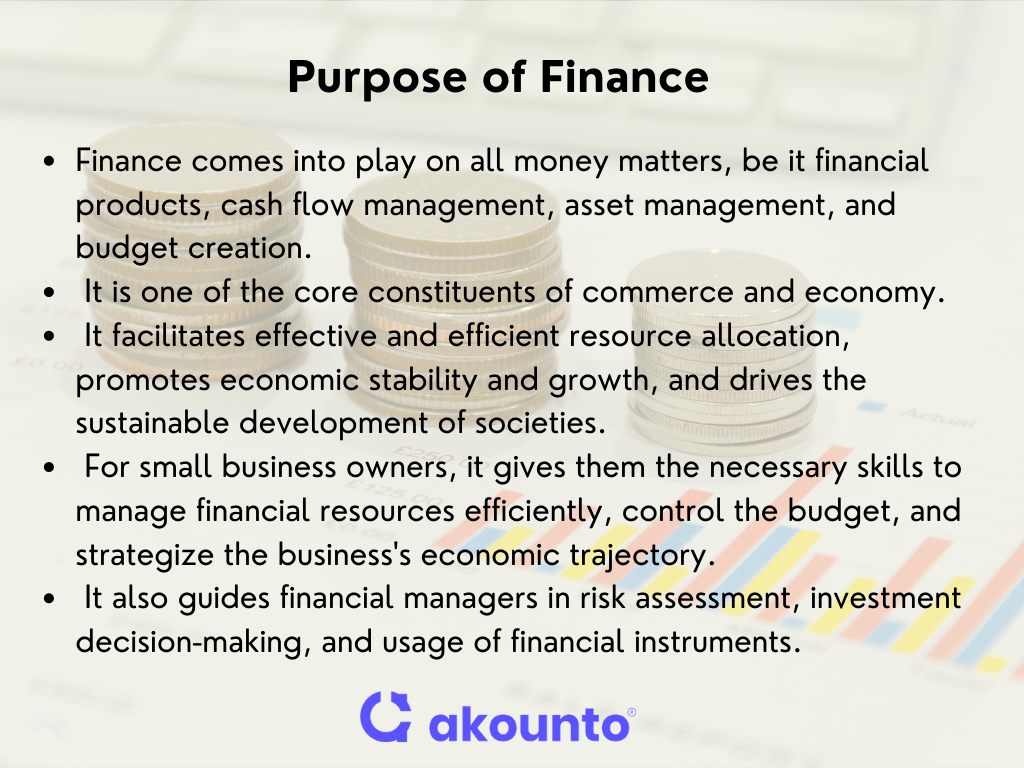What is Finance?
Finance refers to creating and multiplying wealth, managing money and monetary resources, and making decisions regarding investments, budgeting, and arranging money.
Finance is a part of anything that has an aspect of money and value involved with it. Thus, finance is broadly of 3 types:
- Personal finance: How does an individual or a household manage money, wealth, and resources?
- Corporate finance: How do businesses or “for-profit” organizations manage money, wealth, and resources?
- Government finance or Public finance: How does the government or public bodies manage money, wealth, and resources?
Finance can be called a sub-set of economics. Economics is a very wide term that includes macro and microeconomics, covering topics like investing, inflation, budgeting (government and firms), theories and models, sectors of the economy, government’s economic policies, national budgets and infrastructure plans, international economics, currency mechanisms, welfare economics, etc. While finance is much focussed in this scope, it includes activities like:
- Arranging for money/ capital (loans, bonds, stocks, commercial papers, money markets, stock markets, bullion, etc)
- Investing money (stocks and equities, real estate, portfolio management, mutual funds, FDI and FII, debentures, fund management, treasury management, etc.)
- Managing money (liquidity and savings, fixed deposits, treasury management, forex trading, saving certificates, etc.)
- Buying-selling decisions (Capital budgeting, net present value approach, discounting, mergers and acquisitions, Internal Rate of Return, etc.)
- Specialized services (Insurance, mortgages, lease, wealth management, actuarial sciences, valuations, restructuring of debt, securitization, etc.)
Within the broader economic setup, finance careers span a wide array, from roles within financial institutions like banks and the New York Stock Exchange and London Stock Exchange to corporate finance roles within companies. Each institution, whether the Federal Reserve System or a financial industry titan, is a key player in the financial system.
Purpose

The primary purpose of finance, whether business finance or personal finance, is to facilitate the effective and efficient allocation of resources, promote economic stability and growth, and drive the sustainable development of societies.
For small business owners, understanding finance gives them the necessary skills to manage their financial resources efficiently, plan and control their budgets, and strategize their business’s financial trajectory.
Finance guides financial managers in their roles, assisting them in risk assessment, investment decision-making, and using financial instruments.
Finance comes into play on almost all related topics to money matters, be it financial products, cash flow management, asset management, creating budgets, or even personal banking.
History of Finance
The evolution of finance is deeply intertwined with the course of human history, tracing its origins back to the dawn of civilization itself. As early as 6000 B.C., societies engaged in a simple barter system, the first form of trade.
By around 3000 B.C., the ancient Mesopotamians began recording commercial transactions on clay tablets, marking an early iteration of financial accounting. At the same time, the Egyptians utilized a centralized system to manage goods and services, an early nod to today’s financial institutions.
Ancient India made significant contributions. By 500 B.C., systems like the Hundi, an early version of credit and bills of exchange, and rudimentary insurance practices were in place. We also see a treatise on managing government spending, taxation, and resource allocation by the public sector, written “Arthashastra.”
The introduction of coinage by the Lydians around the 7th century B.C. revolutionized transactions, providing a standard and tangible value measure. The financial landscape further transformed with the advent of the first commodity exchanges during the medieval period, around the 11th to 15th century A.D.
Renaissance (14th to 17th century) marked the emergence of modern banking systems and set the foundation for the emergence of the first publicly traded company, the Dutch East India Company. This era also saw the advent of insurance and bonds.
Fast forward to the 20th century, financial systems underwent remarkable innovation and regulatory changes following major economic shocks like the Great Depression and the 2008 financial crisis. Critical regulatory bodies were established in response to these crises, strengthening financial stability worldwide.
Relation between Finance and Economics
Finance definition focuses on how resources, particularly money, are managed, allocated, and invested. It is largely concerned with individual or corporate financial decision-making, encompassing business finance and personal financial planning.
Economics is a broader discipline studying how societies allocate scarce resources to fulfill unlimited wants. It examines economic systems and policies, analyzing market behaviors and trends.
Finance refers to a system that operates within the larger economic framework, considering factors like interest rates and inflation that economics studies. The theories and principles of economics often inform financial decision-making, thus underlining the close relationship between the two fields.
Relation between Finance and Accounting
Finance and accounting are two pillars of the business world, each playing unique yet interrelated roles. Accounting involves recording, summarizing, and presenting financial information, ensuring financial statements like the balance sheet and income statement are accurate and compliant with regulations.
Finance uses this accurate financial information generated by accounting to make decisions about the future, such as whether to invest in a new project or how to raise capital for growth.
Accounting can be viewed as a foundation upon which finance operates, providing the critical data that finance professionals need to plan, analyze, and execute financial strategies.
Types of Finance

Personal Finance
Personal finance encompasses all the financial decisions an individual or a household makes, ranging from budgeting to savings, investments, and even retirement planning. The ability to manage personal savings effectively is crucial to this discipline.
People often overlook the importance of personal finance, but understanding its mechanisms can lead to a better financial future. Personal finance strategies vary widely depending on an individual’s income, lifestyle, goals, and financial attitude.
Corporate Finance
Corporate finance deals with businesses’ financial decisions, covering capital investment decisions, financing, and cash flow management. The chief financial officer is typically in charge of overseeing the financial activities of a corporation, which includes managing cash flow and financial modeling.
As businesses often rely on debt financing, understanding the cash flow statement becomes imperative. Corporate finance aims to maximize shareholder value through strategic planning and implementation of various financial strategies.
Public Finance
Public finance is the study of the role of the government in the economy by understanding government spending, revenue collection, and debt issuance. This discipline deals with budgeting the public sector’s revenues and expenditures and managing them to achieve the most socially beneficial outcome.
Public finance addresses issues such as the efficient allocation of resources, tax policies, distribution of income, welfare financing, and macroeconomic stabilization.
International Finance
International finance refers to the dynamics of the international monetary systems, foreign exchange markets, and the economic and political factors influencing exchange rates which affect trade, the balance of payments, and exchange rates.
Critical to this field is international global financial institutions like the IMF (International Monetary Fund), World Bank, etc. which help maintain global financial stability and aid economic development, respectively. Another key player is SWIFT (Society for Worldwide Interbank Financial Telecommunication), which facilitates global banking transactions.
Regional groups like the Asian Development Bank (ADB) and BRICS (an acronym for Brazil, Russia, India, China, and South Africa) play pivotal roles in regional economic cooperation. Furthermore, systems like UPI (Unified Payments Interface) in India highlight the significance of fintech in revolutionizing international finance.
Behavioral Finance
Behavioral finance introduces the concept of psychology into financial practices, significantly impacting financial activities related to investment, portfolio optimization, and even buying insurance. This field challenges the traditional assumption that all participants in the financial markets behave rationally. It suggests that people often make financial decisions based on biases and emotional reactions rather than logical analysis.
Market failure can occur when these biases and irrational behaviors become widespread, leading to the mispricing of assets and deviations from market equilibrium. Additionally, behavioral finance provides insights into government spending and policy-making decisions, offering a novel perspective on government activity.
The recent development of behavioral finance theories has improved financial modeling by accounting for these psychological factors.
Banking and Financial Services
Banking and financial services form a significant part of the finance domain, providing a wide array of services essential to both individuals and businesses. Banks offer services like savings and checking accounts, loans, overdraft facilities, fund transfers, credit cards, and safe deposit boxes. They are vital in managing money, providing credit, and serving as transaction intermediaries.
Financial services encompass insurance, asset management, investments, and financial planning services. Investment firms help individuals and businesses invest in various financial instruments like stocks, debentures, derivatives, bonds, and mutual funds, offering potential returns on investment.
Examples
Cash Flow Statement
A vital financial report records a company’s cash and cash equivalents flowing in and out over a specific period. It gives investors insight into a company’s liquidity, solvency, and ability to generate and utilize cash.
Raising Capital
Companies often need capital for growth, expansion, or debt repayment. This fundraising can come from issuing stock market shares, taking on bank debt, or reinvesting profits. For example, a tech startup may raise capital through funding rounds with venture capitalists.
Money Management
Money management tracks income, expenses, and financial goals. It includes creating a budget, saving, investing, and planning for retirement. For instance, an individual might set up automatic monthly transfers to their high-interest savings account as part of their money management strategy.
Finance Jobs
The finance sector offers a broad range of job roles, from investment bankers and financial analysts to personal financial advisors and insurance underwriters. For example, a portfolio manager in an asset management firm oversees a portfolio of investments, aiming to maximize returns and minimize risk on behalf of clients.
Earning Interest
Saving money in interest-bearing accounts like savings accounts or certificates of deposit allows individuals to earn interest over time. The interest rate is critical in determining how much you’ll earn.
Future of Finance
The future of finance is being shaped by technological advancements, driving innovation and efficiency in the sector. The fintech sector combines finance and technology, transforming traditional financial services with disruptive solutions.
Artificial Intelligence enhances predictive and prescriptive analysis, improves decision-making processes by forecasting financial trends, and recommends optimal strategies. Enterprise Resource Planning systems streamline operations and improve financial management across organizations.
Automation is another game-changer, reducing manual effort in financial processes, increasing accuracy, and minimizing human error. Mobile applications are simplifying access to financial services, providing convenience to consumers.
Integrating smart technology in financial services provides personalized, intelligent solutions to users, enhancing customer experience and service efficiency. With these advancements, the future of finance looks promising, driven by innovation, efficiency, and customer-centric solutions.
Conclusion
Financial activities like channeling money, managing debt obligations, raising funds, money management, etc., are vital for all economic players. The universal applicability makes knowledge of finance important for the survival of a business, household, and even nation. In the fast-changing environment, all the participants in the financial ecosystem must adapt quickly to take advantage of their growth.
Visit Akounto’s Blog for interesting finance, accounting, and bookkeeping articles.




